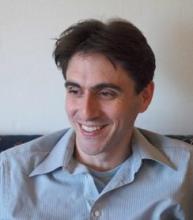Joseph Subotnik Awarded Packard Fellowship

Subotnik was one of 16 researchers chosen from 98 nominees representing 50 universities. His work involves the dynamics of electron and energy transfer, particularly in the case of solar energy.
“The Packard Foundation is fortunate to be able to award this Fellowship to these talented researchers. Their important work has the ability to profoundly impact the lives of their students and all of us in the world at large,” said Lynne Orr, chairman of the Packard Fellowship Advisory Panel. “For 25 years, my colleagues and I at the Foundation and on the Advisory Panel have been inspired by the Packard Fellows’ creativity, leadership in their fields and important breakthroughs in science and engineering.”
David Packard established the Fellowship in 1988 to allow the nation’s most promising professors to pursue science and engineering research early in their careers.
Subnotnik has been honored with several other awards this year, including a Presidential Early Career Award for Scientists and Engineers. This is the highest honor bestowed by the United States government on science and engineering professionals in the early stages of their independent research careers. He also received an Alfred P. Sloan Fellowship, an American Chemical Society HP Outstanding Junior Faculty Award, and a National Science Foundation CAREER Award.
“Joe is exemplary of the brilliant young faculty Penn Chemistry has been able to attract within the last few years,” says Hirschmann-Makineni Professor of Chemistry and Chair of the Department of Chemistry Gary Molander. “In Joe's case, one aspect of his research focuses on the manner in which light interacts with matter. He seeks an understanding of how the energy is partitioned between being captured, stored and utilized efficiently, or wasted by producing heat. As simple as this may sound, it is a horrendously challenging problem that has vexed theoretical chemists for decades. Joe has developed models that resolve many of the ambiguities in previous theories. Going forward, his work has major implications for all manner of practical applications, including solar cell and semiconductor development, battery technology, and any other field where a fundamental understanding of energy flow on a molecular basis is required.”
Other News for Joseph Subotnik:
Joseph Subotnik Wins Presidential Early Career Award
Joseph Subotnik Awarded Outstanding Junior Faculty Award
The World Under Light





